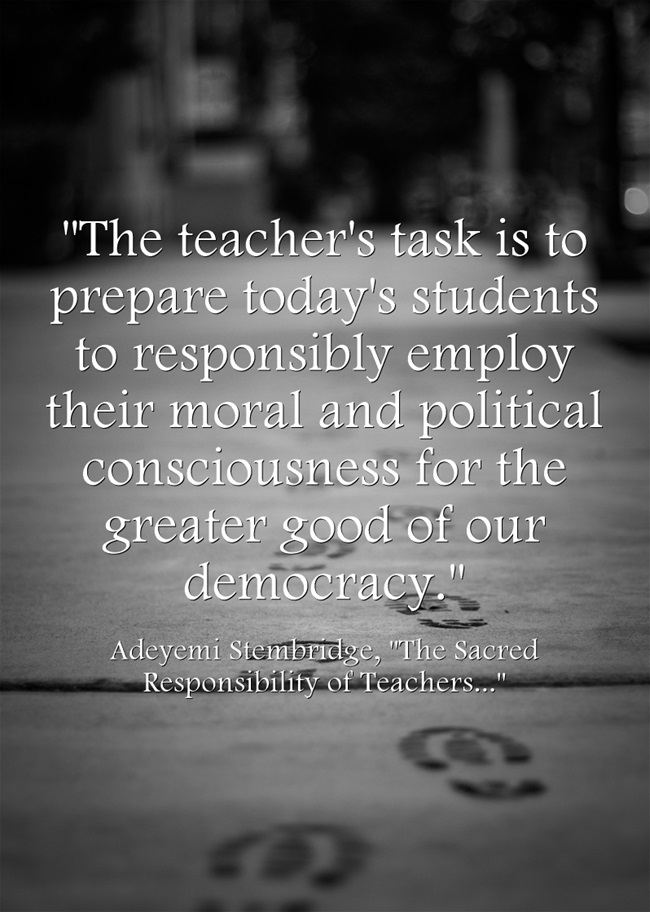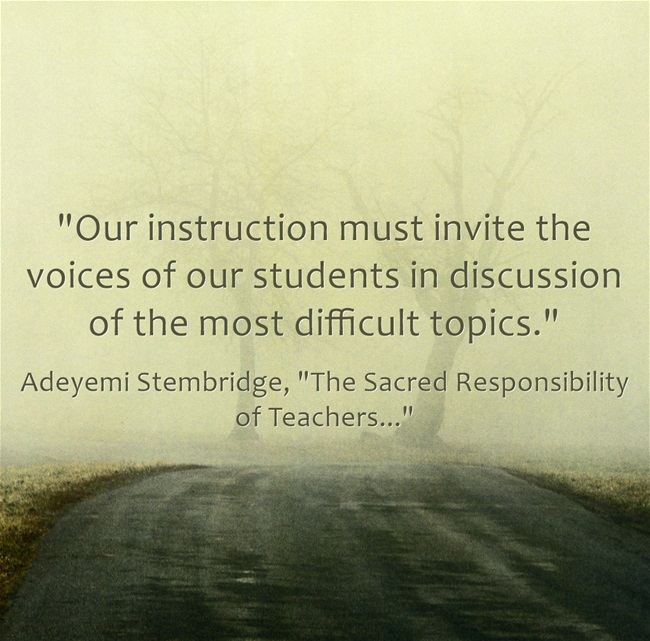Editor’s Note: This is a guest post from Adeyemi Stembridge, PhD. He provides technical assistance for school improvement with a specific focus on equity. He works with districts around the country to identify root causes of achievement gaps and formulate pedagogy- and policy-based efforts to redress the underperformance of vulnerable student populations. Follow him on Twitter at @DrYemiS.
This is the first in a series. Dr. Stembridge will offer specific suggestions of what this ‘sacred responsibility’ looks like in classroom practices.
In September of 1967, Dr. Martin Luther King Jr. gave a keynote to the annual gathering of the American Psychological Association, one of the largest and most respected professional organizations in all of the Social Sciences. In his speech, Dr. King called on this community of behaviorists to give specific attention to the problem of racial inequality because in his view, the Social Sciences – a family of academic areas of study and professional practice that include “expertise, projects, communities, inquiry, and research” concerning “society and the relationships among individuals within a society” – have sacred responsibilities in the interest of America’s pursuit of a free and equal society. Dr. King urged his audience to take the next step to Equality and made clear that the obligation of social scientists is to advance scholarship that is useful in evolving this nation’s troubled relationship with race:
“White America needs to understand that it is poisoned to its soul by racism and the understanding needs to be carefully documented and consequently more difficult to reject.” (King, 1967)
Those on the front-lines of the modern civil rights movement, argued Dr. King, “want the social scientist to address the White community and ‘tell it like it is.‘”
Further, according to Dr. King, the Social Sciences should provide clarity as to the motivations of marginalized people in the pursuit of Equal Opportunity. That clarity is imperative in explaining through research why current attitudes prevail and which methods in the pursuit of Equality have proven to be the most effective in closing opportunity gaps. This work isn’t, however, merely for the benefit of those experiencing the direct impact of racism and bigotry; it is also essential for White Americans whose very humanity is diminished through the perpetuation of narratives and attitudes that oppress Americans who are people of color. Thus the truth-telling responsibility of the Social Sciences is to be honest about our society – even when those truths make us uncomfortable.
Dr. King further implored the conference attendees that:
“Social Science is needed to explain where this [movement] is going to take us. Are we moving away, not from integration, but from the society which made it a problem in the first place? How deep and at what rate of speed is this process occurring? These are some vital questions to be answered if we are to have a clear sense of our direction.” (King, 1967)
The Social Sciences exist to open our eyes to the ways in which we must evolve in order to be a more healthy and productive society; and therefore, in Dr. King’s view, it can’t be said to be good Social Science if it’s neither honest nor enlightening.
Why Does This Apply to Teachers?
Education may be the most applied of all the Social Sciences because it is uniquely and primarily suited to support the practice of enlightening future generations of our society. Through teaching, we convey the most sacred ideals and also the most formal and explicit indoctrinations of our society. In the American experiment – the first civilization where free and public education was thought to be integral in the development of citizens – we prepare students to protect the norms and values which we hold as most treasured in our democracy. Dr. King saw that as a responsibility of cultivating what he called “Creative Maladjustment” or the resolve to never accept those things in our society that undermine our collective capacity to be a democratic people of good will.
Teaching is the embodied operationalization of the Social Sciences. To teach is to nurture the relationships among individuals within a society necessary for our collective well-being. Good teaching prepares students to be stewards of a fair and just society by promoting enlightenment and honesty as goals of the educated. The teacher’s task is to prepare today’s students to responsibly employ their moral and political consciousness for the greater good of our democracy.
In K-12 education spaces, teachers have the same responsibilities of all social scientists to enlighten their students and to be as honest and forthcoming in doing so in order to be considered effective. Teachers must actively pursue truth which entails the empathic listening to others whose view of American opportunity may differ from our own. Our instruction must invite the voices of our students in discussion of the most difficult topics. This way, they can learn through their school experience how to engage with their fellow citizens in these moments when we are growing to be a better nation.
This mission of the Social Science of Education means that teachers must be vulnerable themselves as they facilitate learning experiences which are essential for students to internalize the understandings of what it means to be American. It is only by embracing this difficult work that we give ourselves the chance “to emerge from the bleak and desolate midnight of man’s inhumanity into the bright and glittering daybreak of freedom and justice.”
The first step is to lean into the discomfort that the mission entails.
(To be continued….)





Recent Comments